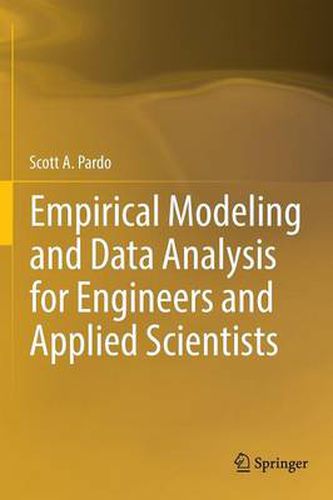Empirical Modeling and Data Analysis for Engineers and Applied Scientists
Scott A. Pardo

Empirical Modeling and Data Analysis for Engineers and Applied Scientists
Scott A. Pardo
This title is printed to order. This book may have been self-published. If so, we cannot guarantee the quality of the content. In the main most books will have gone through the editing process however some may not. We therefore suggest that you be aware of this before ordering this book. If in doubt check either the author or publisher’s details as we are unable to accept any returns unless they are faulty. Please contact us if you have any questions.
This textbook teaches advanced undergraduate and first-year graduate students in Engineering and Applied Sciences to gather and analyze empirical observations (data) in order to aid in making design decisions. While science is about discovery, the primary paradigm of engineering and applied science is design. Scientists are in the discovery business and want, in general, to understand the natural world rather than to alter it. In contrast, engineers and applied scientists design products, processes, and solutions to problems.
That said, statistics, as a discipline, is mostly oriented toward the discovery paradigm. Young engineers come out of their degree programs having taken courses such as Statistics for Engineers and Scientists without any clear idea as to how they can use statistical methods to help them design products or processes. Many seem to think that statistics is only useful for demonstrating that a device or process actually does what it was designed to do. Statistics courses emphasize creating predictive or classification models - predicting nature or classifying individuals, and statistics is often used to prove or disprove phenomena as opposed to aiding in the design of a product or process. In industry however, Chemical Engineers use designed experiments to optimize petroleum extraction; Manufacturing Engineers use experimental data to optimize machine operation; Industrial Engineers might use data to determine the optimal number of operators required in a manual assembly process. This text teaches engineering and applied science students to incorporate empirical investigation into such design processes.
Much of the discussion in this book is about models, not whether the models truly represent reality but whether they adequately represent reality with respect to the problems at hand; many ideas focus on how to gather data in the most efficient way possible to construct adequate models.
Includes chapters on subjects not often seen together in a single text (e.g., measurement systems, mixture experiments, logistic regression, Taguchi methods, simulation)
Techniques and concepts introduced present a wide variety of design situations familiar to engineers and applied scientists and inspire incorporation of experimentation and empirical investigation into the design process.
Software is integrally linked to statistical analyses with fully worked examples in each chapter; fully worked using several packages: SAS, R, JMP, Minitab, and MS Excel - also including discussion questions at the end of each chapter.
The fundamental learning objective of this textbook is for the reader to understand how experimental data can be used to make design decisions and to be familiar with the most common types of experimental designs and analysis methods.
This item is not currently in-stock. It can be ordered online and is expected to ship in 7-14 days
Our stock data is updated periodically, and availability may change throughout the day for in-demand items. Please call the relevant shop for the most current stock information. Prices are subject to change without notice.
Sign in or become a Readings Member to add this title to a wishlist.


